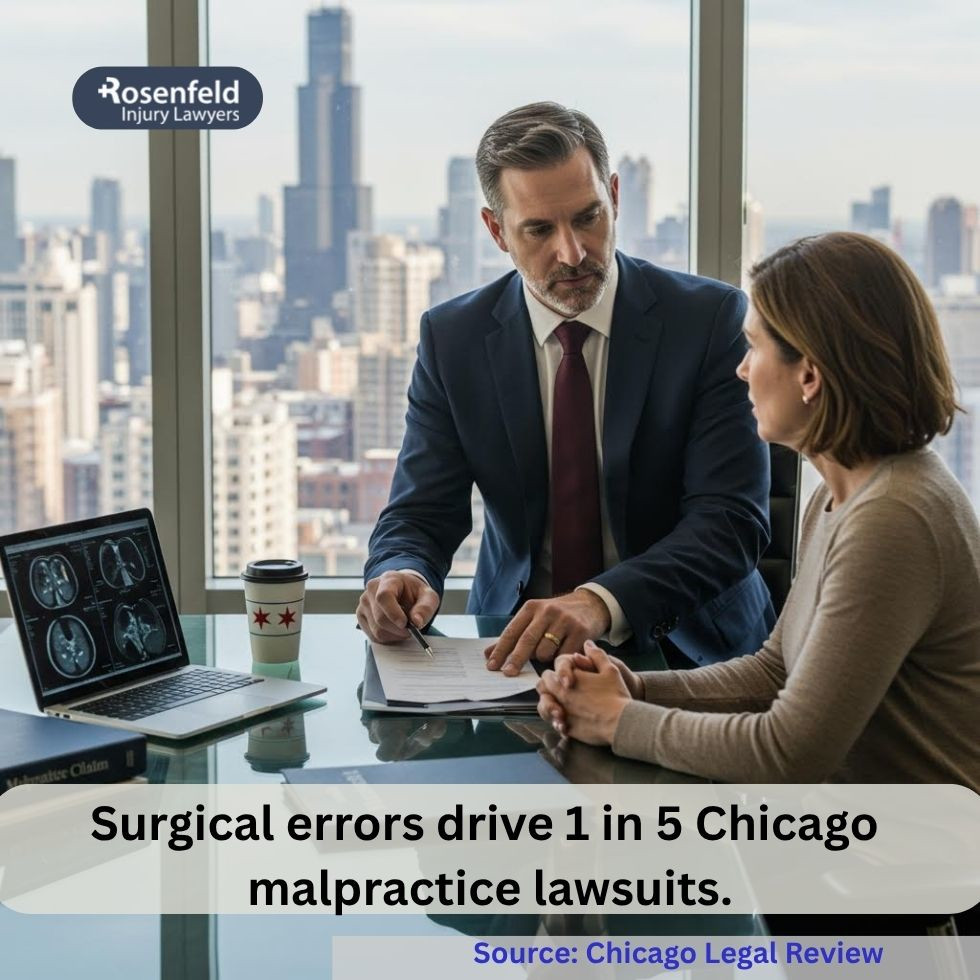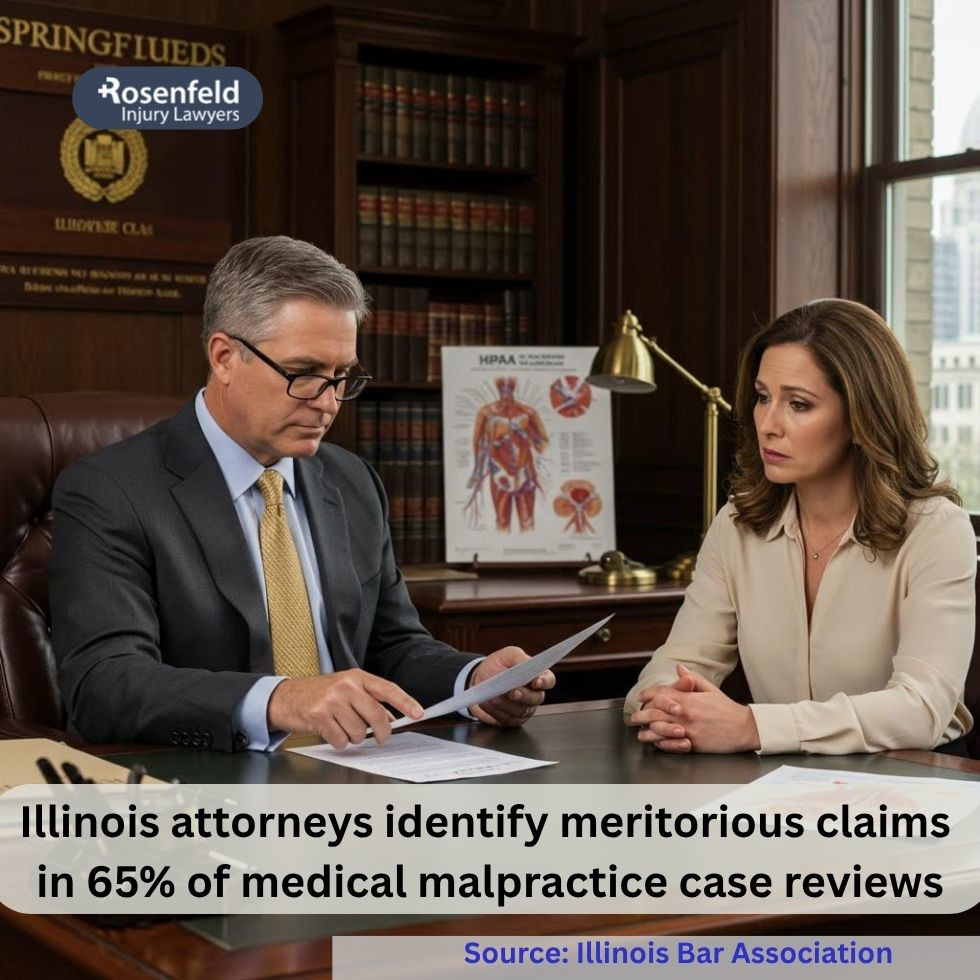- 24/7 Free Consultation: (888) 424-5757 Tap Here To Call Us
How to File a Malpractice Lawsuit in Illinois
This page explains how to file a malpractice lawsuit in Illinois and what to expect throughout the process. Filing a lawsuit in Illinois involves a series of legal steps designed to hold a healthcare provider accountable for negligent medical care.
Whether you’re dealing with surgical errors, misdiagnosis, or another form of medical negligence, it’s essential to understand your rights under Illinois law. A medical malpractice lawsuit can help injured patients seek compensation for medical bills, lost income, and future medical expenses.
What is Medical Malpractice?
Medical malpractice occurs when a healthcare professional fails to provide the level of care that a reasonably skilled and competent provider would offer under similar circumstances. This is known as the “standard of care.”
When a doctor, nurse, or other medical professional deviates from this standard and causes harm, the injured person may have grounds for a medical malpractice claim. Common examples include misdiagnosis, surgical errors, and improper treatment that leads to avoidable injury.

Elements of a Successful Medical Malpractice Claim
To succeed in a medical malpractice case in Illinois, you must prove four essential elements: duty, breach, causation, and damages. These form the legal foundation of your claim and must be demonstrated with supporting evidence, often including medical records and expert testimony.
Duty of Care: Establishing the Doctor-Patient Relationship
The first step in a medical malpractice claim is showing that a doctor-patient relationship existed. This relationship creates a legal duty for the doctor or medical professional to provide care that meets the standard expected of a reasonably competent provider.
Once this relationship is confirmed, the healthcare provider is required to treat the patient with the appropriate level of skill and attention for their profession and specialty.
Breach of Duty: Deviation from the Standard of Care
To prove breach of duty, you must show the provider failed to act in a way that aligns with how a reasonably skilled medical professional would behave in the same situation. This includes acts of negligence or failure to act when required. A medical expert is often necessary to explain what the accepted standard of care is and how the doctor’s conduct fell short of that standard in your specific case.
Causation: Linking Negligence to the Injury
Causation means demonstrating that the doctor’s negligence directly led to your injury or worsened your condition. It’s not enough that a medical mistake was made—there must be a clear link between the breach and the harm suffered.
In many medical malpractice cases, this requires expert testimony to explain how the provider’s conduct caused specific complications, delayed recovery, or worsened medical outcomes that would not have occurred otherwise.
Damages: Suffering a Quantifiable Loss
The final element is proving that you suffered actual damages. This may include physical pain, emotional trauma, additional medical expenses, lost wages, or long-term disability. These losses must be measurable and supported by documentation, such as medical bills, employment records, or expert evaluations.
Without proven damages, a civil lawsuit cannot succeed, even if all other elements—duty, breach, and causation—are established. Damages form the basis for the compensation you seek in your claim.
Common Examples of Medical Malpractice
Common examples of medical malpractice include misdiagnosis or delayed diagnosis, which can prevent timely treatment and worsen a patient’s condition. Surgical errors may involve operating on the wrong body part or leaving instruments inside the patient. Medication mistakes include prescribing the wrong drug or dosage, leading to harmful side effects.
Birth injuries, such as oxygen deprivation during delivery, can result in long-term disabilities. Anesthesia errors—like failing to monitor the patient properly—can cause serious injury or even death. Each of these involves a breach of the standard of care.

The Importance of Consulting with an Attorney
Consulting with an experienced medical malpractice attorney is essential if you believe you’ve been harmed by a healthcare provider’s negligence. These cases are often complex, requiring a deep understanding of both medical standards and Illinois malpractice law.
A skilled attorney can evaluate whether your claim meets the legal requirements, help gather expert medical opinions, and identify the full extent of damages. Without legal guidance, injured patients may struggle to meet strict deadlines, comply with procedural rules, or counter the defense strategies used by doctors and insurance companies. Legal support improves your chances of a fair recovery.
Gathering Evidence to Support Your Claim
To successfully pursue a medical malpractice lawsuit, you’ll need clear, well-organized evidence to support your claim. Building a strong case begins with documenting what happened, how it affected you, and the medical professional involved. The evidence you collect will help demonstrate that your healthcare provider breached the standard of care and caused you harm.
Medical Records
You have the legal right to access your medical records under Illinois and federal law. These records are a critical part of your malpractice claim. To obtain them, submit a written request to each provider involved in your care. Include your name, date of birth, dates of service, and a specific description of the records you need.
Providers may charge a reasonable fee for copies. These records help show what care was provided and whether standard protocols were followed.
Documenting Your Injuries and Treatment
Keep a personal record of everything related to your injury and care. This includes dates of doctor visits, medical treatments received, medications prescribed, and any physical or emotional symptoms experienced.
Save bills, receipts, and insurance correspondence. A daily journal documenting pain, limitations, or emotional distress can also be valuable. These details help quantify your losses and illustrate the extent of the harm caused by the healthcare provider’s negligence.
Identifying Potential Witnesses
Witnesses can provide important context and support for your claim. Identify anyone who may have seen the negligent act or observed the effects of the malpractice—this could include family members, nurses, or other healthcare staff.
Collect their full names and contact information as soon as possible, while memories are fresh. Their statements could help confirm your version of events or challenge the credibility of the provider’s defense.
Seeking a Second Medical Opinion
A second opinion from an independent healthcare provider can strengthen your case by confirming that the original provider’s actions fell short of accepted standards. This new provider can review your records, evaluate your condition, and determine if proper care was given.
Their findings may later support expert testimony. Seeking this opinion early shows that you took steps to understand your injuries and build a fact-based malpractice claim.

The Affidavit of Merit Requirement in Illinois
Under Illinois law, most medical malpractice claims must include an affidavit of merit. This affidavit confirms that a qualified healthcare professional has reviewed the case and believes it may have legal merit. It is intended to prevent frivolous claims and ensure there is a medical basis for the lawsuit before proceeding in court (735 ILCS 5/2-622).
Who Can Provide an Affidavit of Merit?
To provide a valid affidavit of merit, the healthcare professional must be licensed in the same or a similar medical field as the defendant. They must have experience and knowledge relevant to the case, ensuring their opinion reflects accepted standards of care. Medical malpractice law aims to ensure the reviewing professional is truly qualified to assess whether malpractice may have occurred.
Contents of the Affidavit of Merit
The affidavit must state that the reviewing medical professional has examined the medical records and believes, based on their expertise, that the case presents a reasonable and meritorious basis for filing. It should also include the credentials of the reviewing expert and a written report outlining their opinion and conclusions about the care provided.
Deadline for Filing the Affidavit of Merit
In Illinois, the affidavit of merit must be filed within 90 days of the malpractice complaint. If you are unable to obtain it in time, you may request an extension from the court. Failure to file the affidavit within the allowed time can result in the dismissal of your case.

Filing Your Medical Malpractice Lawsuit
Once you’ve gathered your evidence and affidavit of merit, the next step is officially filing the lawsuit. This involves preparing your complaint, choosing the correct court, and properly serving the defendant. Each step must follow Illinois procedures to avoid delays or dismissal. Filing correctly helps move your case forward and demonstrates that you’re serious about pursuing compensation for your injuries.
Drafting the Complaint
The complaint is the legal document that starts your case. It must clearly identify the parties involved, outline the factual background, list your legal claims (such as negligence), and state the specific relief you’re seeking—typically, compensation for damages. It should also reference the attached affidavit of merit. A clear, well-organized complaint sets the foundation for your case and informs the court and defendants about your allegations.
Choosing the Right Court: Jurisdiction and Venue
Medical malpractice claims in Illinois are typically filed in the circuit court of the county where the malpractice occurred or where the defendant resides. This court must have both subject matter jurisdiction (authority to hear medical malpractice cases) and personal jurisdiction over the defendant. Choosing the wrong venue can lead to delays, so it’s essential to file in the proper location.
Filing the Complaint and Affidavit of Merit with the Court Clerk
Once the complaint and affidavit of merit are complete, they must be filed with the court clerk in the chosen circuit court. There are filing fees, which vary by county, but fee waivers may be available for qualifying plaintiffs. After filing, your case will receive a case or docket number, which will be used for all future filings and court communications.
Serving the Defendant(s) with the Lawsuit
After filing, the defendant must be formally served with the complaint and a summons. Service can be completed by a sheriff’s deputy, a licensed process server, or certified mail (with court approval). Proper service is legally required to ensure the defendant is notified of the lawsuit and has an opportunity to respond. Failure to serve properly can result in dismissal.

The Litigation Process: What to Expect After Filing
Once your medical malpractice claim is filed, the defendant must respond—usually by answering the complaint or filing a motion to dismiss. The discovery phase follows, where both sides exchange evidence, medical records, and take depositions. Expert witness testimony is crucial to establish whether the standard of care was breached.
Throughout the case, there may be motions and court hearings on procedural or substantive issues. Many lawsuits settle out of court , but if no agreement is reached, the case proceeds to trial, where a judge or jury decides the outcome.
Statute of Limitations for Medical Malpractice in Illinois
In Illinois, the statute of limitations for medical malpractice claims is generally two years from the date the injury was discovered or should have been discovered, but no more than four years from the date of the alleged malpractice. Exceptions apply for minors, disabled individuals, or cases involving fraudulent concealment (735 ILCS 5/13-212).
Why You Need an Experienced Medical Malpractice Lawyer
Medical malpractice cases are complex, requiring deep knowledge of both legal standards and medical procedures. An experienced medical malpractice lawyer in Chicago can help you gather evidence, work with qualified medical experts, and meet all legal deadlines.
At Rosenfeld Injury Lawyers, we understand how to build strong claims and deal with insurance companies and defense attorneys. Our team is committed to helping injured patients pursue compensation for medical expenses, lost income, and pain and suffering.
Contact Us for a Free Consultation About Your Medical Malpractice Case

If you or a loved one has been harmed by medical negligence, don’t wait to explore your legal options. The experienced team at Rosenfeld Injury Lawyers is here to help you understand your rights and pursue fair compensation.
Our Chicago personal injury lawyers offer a free case evaluation to review your medical malpractice case and provide clear guidance. Call us at (888) 424–5757 or fill out our contact form to speak with a Chicago medical malpractice attorney today.
All content undergoes thorough legal review by experienced attorneys, including Jonathan Rosenfeld. With 25 years of experience in personal injury law and over 100 years of combined legal expertise within our team, we ensure that every article is legally accurate, compliant, and reflects current legal standards.







